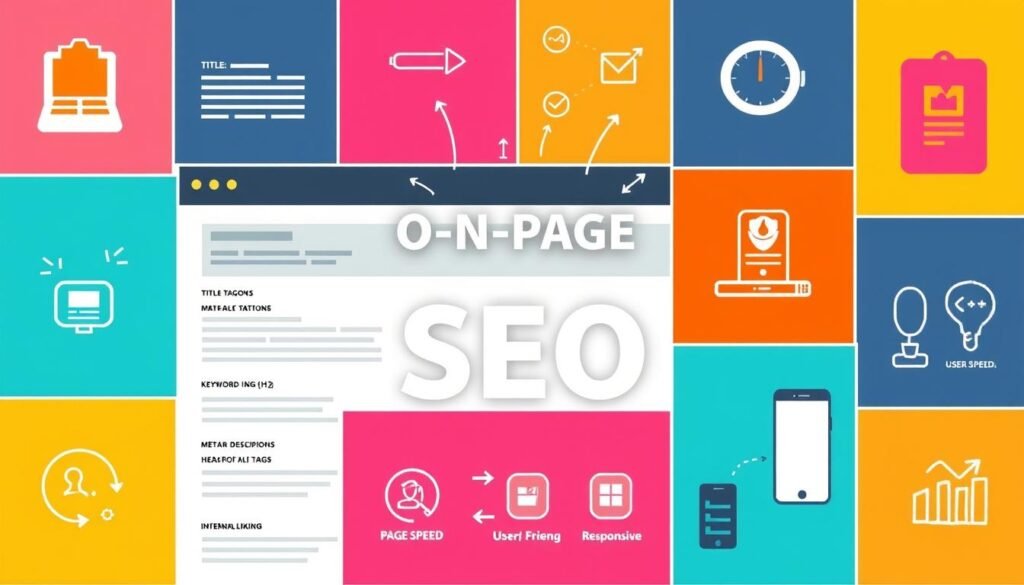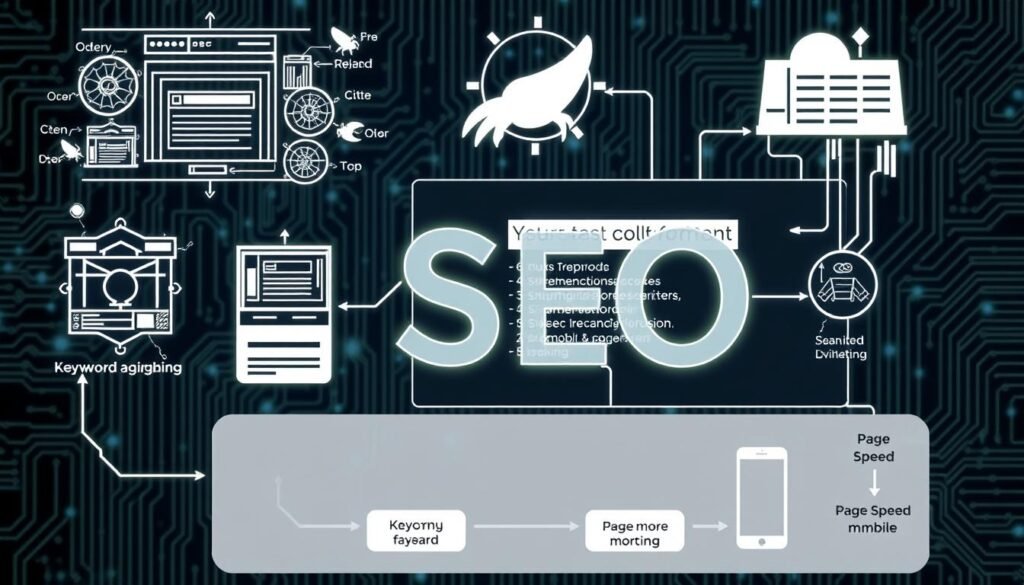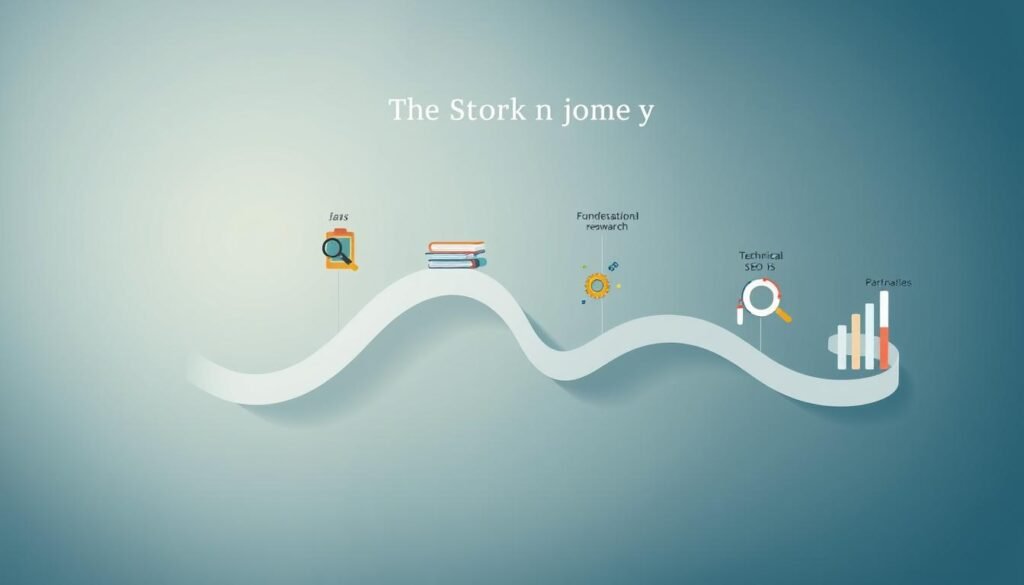Did you know it can take weeks to years to get good at search engine optimization (SEO)1? The time it takes varies a lot, leading to confusion. In this guide, we’ll look at what affects your SEO learning time and give you a clear plan to improve your skills.
SEO can seem overwhelming because it’s always changing. To rank well on search engines, you need to know a lot2. Whether you run a business, market products, or create content, knowing SEO is key. It helps bring more people to your site, making it more visible and successful online.
Key Takeaways
- The time it takes to learn SEO can vary a lot, from weeks to years, based on several factors.
- Things like your goals, how much you’re willing to learn, what you already know, and the resources you have can affect how long it takes to learn SEO.
- Getting good at SEO means knowing the basics, practicing, and always learning more.
- You can learn SEO through free online courses, university programs, or by exploring on your own.
- Understanding search engine algorithms, finding the right keywords, and knowing how to optimize your content are essential for becoming an SEO expert.
In this guide, we’ll dive into the details of learning SEO. We’ll give you a clear path to go from a beginner to an SEO expert. Whether you’re just starting or want to improve your skills, this guide will help you succeed in the fast-changing world of SEO.
Introduction
Learning search engine optimization (SEO) is not a one-size-fits-all task. The time it takes to learn SEO can vary a lot. Even after 5 years, an SEO copywriter might not know everything3. Knowing what affects your learning time is key to setting realistic goals and finding a successful path.
Contradictory Information on Learning SEO Duration
The web is full of different opinions on how long it takes to learn SEO. Some say it can be done in weeks, while others think it’s a lifelong journey. This difference comes from the SEO industry’s constant changes, thanks to updates from search engines4.
Factors Determining SEO Learning Timeline
- Your ultimate goal: Are you learning SEO for personal use, to enhance your own website, or to provide professional services3?
- Time dedication: How much time can you commit to learning and implementing SEO techniques on a consistent basis3?
- Technical aptitude: How quickly can you grasp SEO concepts and apply them to your website or client projects3?
- Existing knowledge and experience: Do you have prior experience with digital marketing or website optimization3?
- Access to resources: What tools, courses, and mentors are available to support your SEO learning journey3?
- Budget: Are you willing to invest in paid resources, such as SEO tools or online courses, to accelerate your learning3?
The time it takes to master SEO can vary from a few months to a couple of years3. Remember, SEO is a lifelong journey. Search engines are always changing, and keeping up with new trends and practices is essential to stay ahead.
Prerequisites for Learning SEO
Before starting your SEO learning journey, it’s key to know the basics. There’s no one right way to become an SEO expert. But, some things can help you get started. Let’s look at what you need to know for effective SEO.
Online Courses and Resources
Online courses and resources are great for learning SEO. Sites like Udemy, Coursera, and Noble Desktop5 have detailed SEO training. These programs include videos, quizzes, and projects to help you learn5.
There are also many SEO-focused websites, blogs, and podcasts. They offer valuable insights and tips. This content helps build your SEO knowledge and keeps you updated with new trends.
Hands-on Practice and Experimentation
SEO needs both theory and practice6. Learning by doing is recommended. Start by setting up websites and trying to rank them in search engines6. This way, you can apply what you’ve learned and see how it works.
As you start learning SEO, stay curious and open to trying new things. Practical experience and ongoing learning are essential for mastering SEO.
“The more you practice, the better you get. Consistency is key when it comes to improving your SEO skills.”
| Online Courses and Resources | Hands-on Practice and Experimentation |
|---|---|
|
|
By using online resources, practicing, and always learning, you’ll get better at SEO65.
Understanding SEO Fundamentals
How Search Engines Work
First, let’s dive into how search engines work. They are advanced software that scans billions of web pages. They sort these pages based on how well they match what users are looking for7. The bots, or “spiders,” explore the web, checking links and content to see how important each page is8.
Indexing and Improving Indexability
Your site needs to be indexed to be considered for a top spot. Indexability means search engines can crawl and store your site’s content8. To see if your site is indexed, search for it on Google using “site:your site URL”. If it’s not, you’ll need to work on making it more indexable7.
Boosting your site’s indexability is key to being seen by search engines and your audience. By understanding search engines and improving indexability, you set the stage for better SEO. This will help more people find your site8.
Mastering Keyword Research
Keywords are key to a good SEO plan. Search engines use them to figure out what a webpage is about. Knowing how to find the right keywords is very important for SEO experts.
Importance of Keywords in SEO
Keywords are super important for SEO. They help search engines find the right content for what users are looking for. By finding the right keywords, we can make content that people want to see9. Good keyword research is needed for all parts of SEO, like optimizing pages and making content.
Keyword Research Tools and Techniques
To find the best keywords, we use special tools and methods10. Tools like Ahrefs, Semrush, and Google’s Keyword Planner help us find top keywords. They also show us how often people search for them and what they’re looking for. This helps us make a keyword plan that meets our audience’s needs.
We can also use other ways to find keywords, like looking at what competitors do and talking to our audience11. This way, we get a wide range of keywords. These keywords help bring more people to our site and improve our SEO.
“Keyword research is the foundation of any successful SEO strategy. It’s the key to understanding what your target audience is searching for and how to effectively reach them.”
Types of SEO and Their Relevance
There are two main types of search engine optimization (SEO): on-page SEO and off-page SEO. Some also see technical SEO as a separate part, focusing on the website’s structure and code12. Knowing about these types of SEO is key to a good digital marketing plan.
On-Page SEO
On-page SEO makes your website better for search engines. It includes keyword optimization, image optimization, and making sure your content is good for your audience13. This helps your site show up better in search results.
Off-Page SEO
Off-page SEO is about what you do outside your website to help it rank better. It’s mainly about link building and social media engagement. These actions show search engines your site is trustworthy13.
Technical SEO
Technical SEO deals with your website’s technical side. This includes the site code and structure, site speed, and mobile-friendliness. These are important for a good user experience and search engine rankings13.
Knowing how to use on-page, off-page, and technical SEO is vital for lasting success in SEO1213. A complete strategy that covers all these areas can boost your website’s visibility and help you reach your digital marketing goals.
On-Page SEO Tactics
Improving your website’s search engine rankings starts with mastering on-page SEO. Focus on keyword optimization and image optimization. Let’s explore their importance and best practices.
Keyword Optimization
Keyword optimization means adding relevant keywords to your content. This includes titles, meta descriptions, headings, and subheadings. It helps search engines understand your page’s context and relevance, boosting your visibility in search results12.
For effective keyword optimization, start with thorough keyword research. Use tools like Google Keyword Planner to find valuable terms13. Remember, basics like targeting and quality link building are key for lasting SEO success13.
Image Optimization
Image optimization is vital for on-page SEO. Make your images smaller and use keyword-rich file names, alt text, and descriptions. This can greatly improve your website’s search engine visibility12.
By using on-page SEO tactics like keyword and image optimization, you can boost your website’s rankings. This drives more targeted traffic to your content13. SEO is a continuous effort, and consistent work is essential for long-term success13.

Off-Page SEO Strategies
Off-page SEO strategies are as important as on-page tactics for better website rankings. These strategies improve your website’s visibility and credibility to search engines. Key strategies include link building and social media presence.
Link Building
Link building means getting backlinks from other websites to yours. These backlinks show search engines your site is valuable and relevant14. Getting links from authoritative sources boosts your site’s ranking14.
Google uses links to judge your web page’s quality and relevance14. The more quality backlinks you get, the higher your site’s authority14.
It’s key to get links from credible, relevant sites. The site’s popularity, relevance, trust, and authority matter for link value14. Avoid unethical link-building to avoid ranking drops.
Social Media Presence
An active social media presence is a valuable off-page SEO strategy15. Social signals like shares and likes boost your site’s reputation15. A strong social media brand presence also drives more targeted traffic to your site.
Engage with your audience, run campaigns, and collaborate with influencers to boost your social media SEO15. Make sure your social media profiles are optimized with accurate info and keywords.
“Google emphasizes the importance of links and citations for understanding and ranking search results.”14
By focusing on link building and a strong social media presence, you can enhance your off-page SEO. This improves your website’s search engine visibility and credibility.
Technical SEO Aspects
At the heart of successful search engine optimization (SEO) lies the technical aspects of your website. Optimizing the site’s code, structure, speed, and mobile-friendliness can significantly impact your search engine rankings, website traffic, and overall user experience1617.
Site Code and Structure
Ensuring your site’s code is clean, optimized, and structured logically is key. This makes it easier for search engines to crawl and index your content. Tasks like minifying CSS and JavaScript files can improve site speed16. Keeping a consistent URL structure also helps with crawlability17.
Using a flat site structure with minimal layers helps search engines find and index your webpages18. Breadcrumb navigation can also improve user navigation and engagement18.
Site Speed and Mobile-Friendliness
In today’s fast-paced digital landscape, website speed and mobile optimization are key. Google’s Core Web Vitals, introduced in 2020, include loading speed, interactivity, and visual stability as key ranking factors16.
- Ideally, a webpage should load within 2.5 seconds, with the Largest Contentful Paint (LCP) also loading within this timeframe16.
- First Input Delay (FID), a measure of interactivity, should be kept under 100 milliseconds16.
- Cumulative Layout Shift (CLS), which measures visual stability, should be maintained at 0.1 or less16.
Optimizing images, leveraging Content Delivery Networks (CDNs), and ensuring a responsive, mobile-friendly design can all improve site speed and user experience1718.

By addressing these technical SEO aspects, you can enhance your website’s performance, search engine visibility, and overall user experience161718.
how long does it take to learn seo
Learning SEO is a journey that takes different amounts of time. It can take just 4-6 weeks to learn the basics. But, becoming a true SEO expert can take up to 5-8 years19.
The time it takes depends on several factors. These include how much you want to learn, how much time you can commit, and your experience. Even the quality of resources you use matters19.
Those starting a career in SEO should plan to spend 3-6 months learning. This time is needed to understand both the theory and practice of SEO19.
People who are tech-savvy might learn faster. They are good at trying new things and solving problems19. But, it’s important to keep going, even when it gets tough19.
Using top-notch resources is key to learning SEO. Google’s Search Central Documentation and Search Quality Raters Guidelines are great places to start19. They offer deep insights into search engines and how to make websites better for search results19.
Experts say beginners can learn SEO in 4-6 months20. But, learning faster is possible with a plan and hard work20. Search engines change a lot, so you need to keep learning to stay up-to-date20.
In summary, how long it takes to learn SEO varies. It depends on your effort, the resources you use, and your ability to adapt to changes in SEO1920.
Learning Timeline and Milestones
The journey to learn SEO has three main stages. Each stage has its own goals and achievements. Knowing these stages helps aspiring SEO experts on their path to success.
Initial Months: Fundamentals and Basics
The first few months focus on the basics. This period, lasting 1 to 3 months, covers the basics of search engines and indexing. It also includes keyword research21. This foundation is key for the next steps.
Intermediate Stage: Advanced Techniques
The next stage is about learning advanced SEO techniques. It lasts 4 to 6 months and covers on-page, off-page, and technical SEO22. You’ll learn about keyword optimization and link building. By then, you’ll know how to use SEO in different ways.
Mastery Stage: Analysis and Optimization
The final stage is about mastering analysis and optimization. It can take 6 to 12 months. You’ll learn to monitor and improve your SEO efforts23. This stage is about making your SEO work better and staying ahead.
It’s important to keep growing and learning throughout your journey. Stay current with trends and be ready to change. With hard work and a smart plan, you can master SEO.

Conclusion
Learning SEO is a journey, not a one-time task. Search engines and best practices keep changing. But, by following a plan and putting in effort, we can get good at SEO in 7-12 months24.
We should start with the basics, then grow our skills. Always check and improve our SEO plans based on what works25.
With hard work and the right tools, we can become SEO experts. This unlocks more organic traffic for our business24. It might take time to fully understand SEO, but the benefits are huge.
SEO is not a one-time job. It’s a continuous learning and adapting process. Keep up with new trends, try new things, and see how they work. By doing this, we can make our websites successful for a long time25.
FAQ
How long does it take to learn SEO?
What are the key factors that determine the SEO learning timeline?
What are the prerequisites for learning SEO?
How do search engines work, and why is indexing important for SEO?
What is the importance of keywords in SEO?
What are the different types of SEO and their relevance?
What are the key on-page SEO tactics?
What are the key off-page SEO strategies?
What are the key technical SEO aspects?
Source Links
- How Long Does It Take To Learn SEO? – https://www.bkacontent.com/how-long-does-it-take-to-learn-seo/
- How Long Does it Take to Learn SEO for a Beginner? – https://seobuddy.com/blog/how-long-does-it-take-to-learn-seo/
- How Long Does It Take To Learn SEO? [3 minutes if you read this] — Your Creative Content – https://www.yourcreativecontent.com/blog/how-long-does-it-take-to-learn-seo
- How to Learn SEO: A Beginner’s Guide for SMBs | Collaborada – https://www.collaborada.com/blog/how-to-learn-seo
- What to Learn Before SEO – https://www.nobledesktop.com/learn/seo/prerequisites
- Prerequisites to Learning SEO – The Raven Blog – https://raventools.com/blog/prerequisites-learning-seo/
- How Long Does it Take to Learn SEO? – https://www.nobledesktop.com/learn/seo/how-long-does-it-take-to-learn-seo
- How to Learn SEO (Basics, Tips, & Free Resources) – https://www.semrush.com/blog/learn-seo/
- How Long Does It Take to Learn SEO? A 2023 Guide for Beginners – https://www.seocompany.com/how-long-does-it-take-to-learn-seo/
- How Long Does It Take to Learn SEO? – Walter Voronovic – https://waltervoronovic.com/digital-marketing/how-long-does-it-take-to-learn-seo/
- Launch Your Own Reputation Management Platform – https://reviewgrower.com/how-long-does-it-take-to-learn-seo/
- How Long Does It Take To Learn SEO? (Timeline Included) – https://trioseo.com/how-long-does-it-take-to-learn-seo/
- How Long Does it Take to Learn SEO? A Complete Beginner’s Guide – https://www.nack.ai/blog/posts/how-long-learn-seo-beginners-guide
- What Is Off-Page SEO? Strategies Beyond Links – https://moz.com/learn/seo/off-site-seo
- Off-Page SEO: The Definitive Guide (2024) – https://backlinko.com/off-page-seo-guide
- Technical SEO | UMC | Michigan Tech – https://www.mtu.edu/umc/services/websites/seo/technical-seo/
- What Is Technical SEO? Basics and Best Practices – https://www.semrush.com/blog/technical-seo/
- Technical SEO: A Beginners Guide To Technical SEO Audits – Hike SEO – https://hikeseo.co/learn/onsite/technical/
- How Long Does It Take To Learn SEO? An SEO Explains – SEOSLY – https://seosly.com/blog/how-long-to-learn-seo/
- How to Learn SEO From Scratch (Includes Learning Plan) – https://www.reliablesoft.net/is-seo-hard-to-learn/
- SEO Timeline: How Long Does It Take To See SEO Results? – https://breaktheweb.agency/seo/seo-timeline/
- How Long Does It Take for SEO to Work? – https://localiq.co.uk/blog/how-long-does-it-take-for-seo-to-work
- How Long Does It Take to See SEO Results? – https://www.webfx.com/seo/learn/how-long-does-it-take-to-see-seo-results/
- How Long Does It Take To Learn SEO? Is It Worth It – https://bitchipdigital.com/how-long-does-it-take-to-learn-seo/
- How Long Does It Take to Learn SEO? – https://www.linkedin.com/pulse/how-long-does-take-learn-seo-anatolii-ulitovskyi
